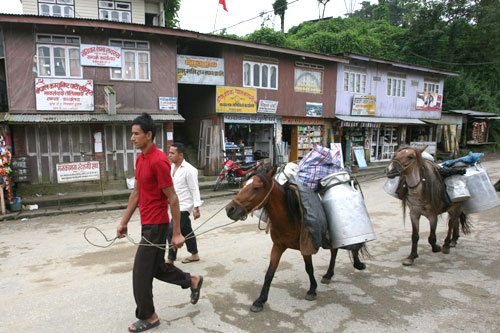 KIRAN PANDAY |
From the hills to the Tarai, 14 million Nepalis do not have proper toilet facilities. They have no choice but to defecate in open spaces every day. The needless deaths of 154 Nepalis in Jajarkot last year were due to their using contaminated water, which inflamed the cholera epidemic in the mid-western hills of Nepal.
Likewise, an estimated 600,000 Nepali women still suffer in silence from uterine prolapse, a preventable reproductive disease, which significantly diminishes their quality of life.
It's fair to wonder why this information is in this space. The answer is straightforward.
Since 1951, such social concerns and others have been addressed in piecemeal fashion by various government bodies, donor agencies, NGOs and community organisations. Though much progress has been made, these and other problems are still with us, sixty years later. The longer they stay with us, the more they slow down our collective ability to benefit from the productivity of a healthy population that can go to school, go to work and contribute to community development.
Helping address such problems need not be the exclusive province of government, NGOs and donor agencies. It's time for both big Nepali businesses and entrepreneurially minded individuals to start using some of their skills, resources and contacts to visibly rethink how they can speed up the process.
Big business: Most trekking trails are littered with instant noodle and snack food plastic wrappers. There is no reason why some of these foodstuff companies cannot, in cooperation with local communities, start a campaign for cleaner cities and villages by providing incentives to customers to return or dispose of used wrappers.
Such an attempt need not be on a grand nationwide scale from the word go. Interested companies could start small, see what works where, and gradually scale up efforts by roping in like-minded partners. This requires patience, persistence, an ability to deal with ambiguities and a range of people with diverse interests. But in these politically fractured times, such visible attempts to do good do pay off in that they strengthen Nepali companies' institutional abilities to get things done by engaging a wider group of internal and external stakeholders.
Some multinational soap companies are running a national media campaign about the importance of hand-washing. That is good, but not enough. They need to think beyond selling an extra cake of soap by actively engaging local civic institutions to make community cleanliness a matter of pride. True, it's not the job of a private company to push the issue of sanitation. But from a business standpoint, if such companies do not find effective ways to work with local health posts, politicians and women's groups, how do they expect customers to emotionally relate to their products as opposed to a competitor's?
Entrepreneurs: Most NGOs are started by socially minded entrepreneurs, who seek to solve a specific problem. Over time, they may receive funding that enables them to grow in terms of staff size and program range. Their growth correlates with a diffusion of their earlier idealism and a loss of measurable goals, which is often accompanied by "this is just a job" mentality.
Nepali entrepreneurs who want to work on social problems are likely to be more effective when they stick to a single concrete issue with clear goalpost - say, providing complete and sustainable access to toilets in a particular set of VDCs or eradicating uterine prolapse in specific development regions by a certain date. Such a focus may be the best way to eradicate the social problems that continue to hamstring Nepal's progress - rather than the usual NGO mode of nibbling away at lofty, vague goals.



